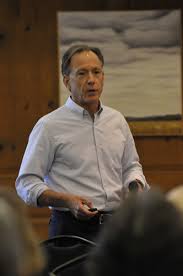
Teaching Islam post-9/11: An Ongoing Intervention in History and Tradition
Many Islamicists, specialists in Islam, talk about the challenge of teaching Islam in a post-9/11 world, a world where the War on Terror (WOT), political chaos in the Middle East (exacerbated by the WOT), and global jihadi violence (which feeds off the WOT) dominates the news. Not surprisingly, this backdrop informs student thinking and contributes to an underlying classroom assumption that Islam has much to answer for. And when “Islam” is up against it, so too are those of us who teach it.
The real challenge, then, is how to teach Islam as if it were just another religious tradition. This should be easy to do since far more has stayed the same in introduction to Islam courses than has changed. In fact, most textbooks that were being assigned in the 1980s or 1990s are still usable today, with some minor tweaking. And the same historical and institutional terrain of tradition-formation must still be covered: pre-Islamic Arabia, Muhammad in Mecca and Medina, the message of the Qur’an, the caliphate, the Arab-Muslim expansion, and the development of Islamic law and Sufism.
With all this sameness, we could ignore the background noise and pretend that Islam has not entered the consciousness of many westerners more as a militant ideology than a religion. Such an option quickly runs into problems, however, because historical fundamentals can seem of a piece with current realities. So, we must be prepared when students equate the self-declared caliphate of the Islamic State with the original office started in the 7th century; when they see the terrorist actions of Osama bin Laden as a continuation of the jihad waged by the Prophet Muhammad to defend the nascent Muslim community from Arab tribal threat; when they connect the anti-Semitic rants of Islamists with the critique of Jews in the Qur’an and Muhammad’s tension with Jewish clans in Medina.
These kinds of miscues are understandable and correctable, but they bring classroom conversations back, again and again, to Islam’s ideological potential. They also demonstrate the way a modern take on Islamic tradition—and a militant, exclusivist one at that—can subvert our capacity to engender historical consciousness among students. For as our students read the present condition of political Islam and global jihadism into the past, they read the past as a natural unfolding of Islam’s violence-prone essence.
Perhaps this accounts for the high number of students majoring in political science and conflict studies who take my introduction to Islam class. Their eyes focused on the current moment of chaos and militancy in the Middle East, they are there to find out what drives it. Islam seems the subject to explore because the prominent (=loudest) Muslim voices they hear in the media, or the ones they selectively listen to the most, legitimize their violence by claiming sole authority over Islamic tradition, and by citing extensively the very sources I hope to get students to understand in their historical context: the Qur’an and sunna.
What I’ve discovered teaching in a post-9/11 environment is that I must be more flexible about how I teach the Islamic tradition, not what I teach. I must be prepared to engage students where they are, not where I want them to be, and this means toggling back-and-forth between medieval and modern, modern and medieval. I need to help students make sense of the past and the present at the same time, often in the same lesson plan. This requires an ongoing intervention in historical contextualization and tradition(s) formation throughout the entire semester.
I still design a syllabus that traces out the development of Islamic tradition(s), but my actual coverage of the material occurs more randomly and in mix-and-match ways that would have struck me as odd and unnecessary earlier in my career.
This methodological shift does not eliminate student suspicion of Islam, and Muslims, but it does challenge students to examine their own assumptions and to consider the complex richness of the tradition and of Muslim voices across time.